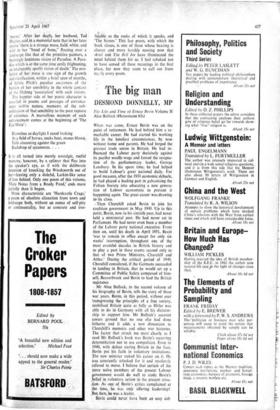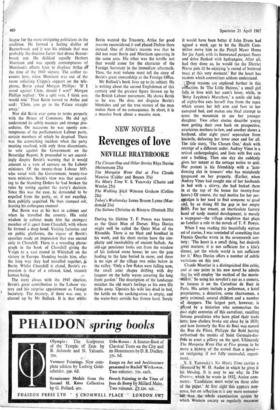The big man
DESMOND DONNELLY, MP
The Life and Time of Ernest Bevin Volume II Alan Bullock (Heinemann 63s) When war came, Ernest Bevin was on the point of retirement. He had behind him a re- markable career. He had started his working life in the loneliest circumstances, by now without home and parents. He had forged the greatest trade union in Britain. He had in- fluenced the Labour party decisively against its pacifist woolly-wogs and forced the resigna- tion of its .parliamentary leader, George Lansbury. In his spare time, he had helped to build Labour's great national daily. For good measure, after the 1931 economic debacle, he had played a leading part in galvanising the Fabian Society into educating a new genera- tion of Labour economists to prevent it happening again. The great career was drawing 6k:its close.
.-Then Churchill asked Bevin to join his coalition government in May 1940. Up to this point, Bevin, now in his sixtieth year, had never held a ministerial post. He had never sat in Parliament. He had never even been a member of the Labour party national executive. From then on, until his death in -April 1951, Bevin `was to remain in office except for only six weeks' interruption, throughout one of the most eventful decades in British history and to play a part in these events second only to that of two Prime Ministers, Churchill and Attlee.' During the critical period of 1940, Churchill considered, if the Germans succeeded in landing in Britain, that he would set up a Committee of Public Safety composed of him- self, Beaverbrook and Bevin to lead the British resistance.
- Mr Alan Bullock, in the second volume of his biography of Bevin, tells the story of these war years. Bevin, in this period, without ever transgressing the principles of a free society, mobilised Britain quite as fully as Hitler was able to do in Germany with all his dictator- ship to support him. Mr Bullock's account covers ground that no one else had done hitherto and it adds a new dimension to Churchill's memoirs and other war histories. The factor that struck me most clearly as I read Mr Bullock's book was Bevin's recurring determination not to use compulsion. Even in 1940, with defeat staring Britain in the face, Bevin put his faith in voluntary institutions. The new minister staked his career on it. He was constantly attacked for it and resolutely refused to move. I believe that certain of the more naive members of the present Labour government would do well to study Bevin's belief in voluntary action in the present situa- tion. As one of Bevin's critics complained at the time, he was only offering leadership! But then, he was a leader.
Bevin could never have been an easy col- league for the more intriguing politicians in the coalition. He formed a lasting dislike of Beaverbrook and it was his attitude that was probably the decisive factor that drove Beaver- brook out. He disliked equally Herbert Morrison and was openly contemptuous of Morrison's efforts later to displace Attlee at the time of the 1945 victory. The author re- counts how, when Morrison was out of the room soliciting Cripps's support on the tele- phone, Bevin asked Morgan Phillips: 'If I stood against Clem, should I win?' Morgan Phillips replied: 'On a split vote, I think you would win.' Then Bevin turned to Attlee and said: 'Clem, you go to the Palace straight away.'
Nor did Bevin ever come to terms properly with the House of Commons. He did not understand its subtle nuances and strange pro- cedures. On occasions he was openly con- temptuous of the parliamentary Labour party, certain members of which he despised. There was the astonishing incident when the patty meeting resolved, with only three dissentients, to vote against the Government on the Beveridge Report. It proceeded to act accord- ingly despite Bevin's warning that it would amount to a vote of censure on the Labotir ministers. Of the twenty-three Labour MPs who voted with the Government, twenty-two were ministers. Bevin's view was that accord- ing to the Standing Orders he had broken the rules by voting against the party's decision. Since this was the case, he demanded to be expelled from the party, or, if not expelled, then publicly acquitted. He then stumped mit, leaving his colleagues stunned.
But Bevin was at his best in cabinet and when he travelled the country. His solid wisdom in cabinet made him the strongest member of it apart from Churchill, with whom he formed a deep bond. Visiting factories and on public platforms, the vigour of Bevin's speeches made an impression that was second only to Churchill. There is a revealing photo- graph in the book of Churchill giving the V-sign to a vast crowd in Whitehall on the victory in Europe. Standing beside him, after the long way they had travelled together, Is Bevin. Whilst Churchill is elated, Bevin's ex- pression is that of a relaxed, kind, staunch human being.
The story closes with the 1945 election, Bevin's great contribution to the Labour vic- tory and his surprise appointment as Foreign Secretary. The mystery, if there was one, is cleared up by Mr Bullock. It is that whilst Bevin wanted the Treasury, Attlee for good reasons reconsidered it and placed Dalton there instead. One of Attlee's reasons was that he did not want Bevin and Morrison operating in the same area. His other was the terrific test that would come for the character of the Foreign Secretary in the immediate aftermath. Thus, the next volume must tell the story of Bevin's great stewardship at the Foreign Office.
Mr Bullock's book lives up to its subject. He is writing about the second Englishman of this century and the greatest figure thrown up by the British Labour movement. He shows Bevin as he was. He does not disguise Bevin's blemishes and yet the true stature of the man makes them of no consequence. In short, it is a massive book about a massive man.







































 Previous page
Previous page